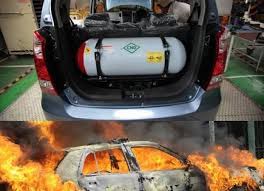The Push for CNG Adoption in Nigeria
As Nigeria continues its shift from petrol and diesel-powered vehicles to Compressed Natural Gas (CNG), a recent incident has thrown safety concerns into the spotlight. On Thursday, October 17, a tragic explosion occurred at a NipCo filling station in Aduwawa, Benin City, Edo State. A car, powered by CNG, exploded while being refilled, leading to several injuries and damaging nearby property.
This incident has left many Nigerians questioning the safety of CNG, especially as the government is aggressively pushing for more citizens to adopt this energy alternative. The Federal Government has been promoting CNG as a cheaper and cleaner fuel source, but this explosion has raised doubts about the readiness of the country for this transition.
Join our WhatsApp ChannelIn a statement on Twitter, the Presidential CNG Initiative also confirmed the incident and expressed sympathy for those injured. The statement read:
“The Presidential CNG Initiative notes the unfortunate incident involving an illegally modified vehicle at a NIPCO CNG station in Aduwawa, Benin City, on Wednesday, October 16, 2024. We commiserate with those injured and are thankful that no lives were lost. Safe handling of hydrocarbons is critical to their safe use.”
The PCNGI further explained that an investigation revealed the cylinder involved had been welded and modified, contrary to approved safety standards for CNG.
Public Outcry and Safety Concerns
The explosion of the CNG-powered vehicle has sparked reactions across Nigeria, with many voicing their fears about the safety of using it. Eyewitnesses from the scene reported that the explosion appeared to be the result of an improperly constructed gas tank, raising questions about the standards being followed for CNG conversions.
Social media platforms were flooded with reactions. One user, Carsblogger, expressed his concern: “I would rather buy fuel at 3k per litre than put CNG in my car! Introducing CNG without proper orientation to the nation is complete nonsense!” Another, Emeka Nwoke, questioned the hype around CNG: “If it is that good and cheap, why isn’t it popular in other climes?”
These reactions reflect a growing fear among Nigerians that the push for CNG adoption may be moving faster than the country’s infrastructure and technical capacity can handle. As the debate continues, many are calling for more safety protocols and public awareness before the conversion efforts intensify.
The Government’s Efforts Toward CNG Conversion
Despite the safety concerns raised by the explosion, the Nigerian government is moving ahead with its plan to convert more vehicles from petrol to CNG. According to recent reports, the Federal Government has distributed 1,200 CNG conversion kits to five states, with the goal of converting 18,000 vehicles by the end of the year.
The National Orientation Agency (NOA) has been actively promoting the benefits of switching to CNG. In a recent announcement, the agency stated, “Switching to Compressed Natural Gas is now more accessible than ever. With tailored payment options, converting from petrol to CNG has never been smoother or more affordable.” While these efforts are commendable, the recent explosion has raised questions about whether safety standards are being strictly enforced.
A key issue seems to be the role of unqualified individuals handling CNG conversions. As one social media user, Stretch™, pointed out, “The major risk in converting to it is the conversion being done by a quack; the result would, of course, be an explosion.” This sentiment was echoed by many others who believe that without proper oversight, the dangers of CNG-powered vehicles could outweigh the benefits.
Safety Standards Must Be Enforced
As Nigeria moves forward with its CNG adoption plan, it is essential that the government and private sector ensure that safety is prioritised. Proper training for those performing conversions, rigorous safety checks, and adherence to international standards must be the norm if Nigeria is to avoid further incidents like the one in Benin City.
In countries where it is widely used, such as India and Brazil, stringent safety protocols are in place to prevent such explosions. In contrast, Nigeria’s rush to adopt them without adequately preparing the necessary infrastructure or training programs could lead to more accidents. As one Twitter user, SuperSlimEli, said, “They keep lying to people that this thing is safe. It’s not fair.”
Nigerians need to be assured that their safety will not be compromised as the country transitions to cleaner energy. More needs to be done to raise awareness about the risks involved in converting vehicles to CNG, especially if these conversions are being carried out by unqualified individuals.
Looking Ahead: The Future of CNG in Nigeria
The push for CNG is part of Nigeria’s broader energy transition plan, aimed at reducing dependence on petrol and diesel. This shift is also intended to reduce fuel costs and lower carbon emissions, aligning with global efforts to combat climate change. However, the explosion in Benin City serves as a sobering reminder that the transition to cleaner energy must not come at the expense of safety.
As the government pushes for 18,000 CNG conversions by year-end, it is crucial that proper safety measures are in place. Nigeria must learn from other countries that have successfully adopted CNG, ensuring that the necessary regulations and training programs are implemented.
In the words of Timmynaija HairDynasty, another social media user, “Installation error, there are so many CNG vehicles in this part of the world, and I have barely heard of such an explosion.” This suggests that CNG can be safe if handled properly. Therefore, Nigeria’s focus must shift toward proper training, certification, and awareness to avoid future incidents.
Is CNG Safe for Nigerians?
The explosion in Benin City has exposed the cracks in Nigeria’s CNG adoption strategy. While the government’s push for CNG is well-intentioned, the safety of Nigerians must come first. Without proper oversight, training, and infrastructure, more incidents like the one in Benin could occur.
As Nigeria continues its energy transition, the question remains: is CNG safe for Nigerians? For now, the answer depends on how well the government can address the safety concerns that have been raised. Only time will tell whether it will become a reliable and safe alternative for Nigeria’s energy future.
Emmanuel Ochayi is a journalist. He is a graduate of the University of Lagos, School of first choice and the nations pride. Emmanuel is keen on exploring writing angles in different areas, including Business, climate change, politics, Education, and others.
- Emmanuel Ochayihttps://www.primebusiness.africa/author/ochayi/
- Emmanuel Ochayihttps://www.primebusiness.africa/author/ochayi/
- Emmanuel Ochayihttps://www.primebusiness.africa/author/ochayi/
- Emmanuel Ochayihttps://www.primebusiness.africa/author/ochayi/


















Follow Us